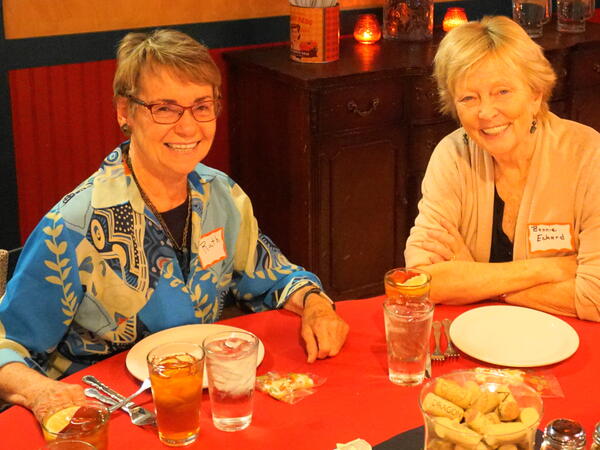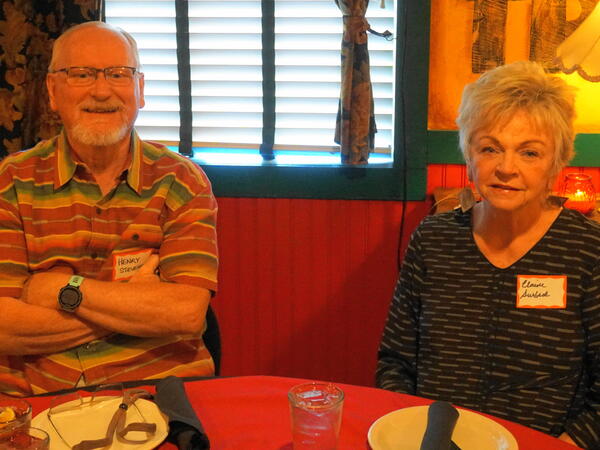
Event report
November 2019 - Fall Luncheon
The ASURA Fall Luncheon was held on Thursday, November 7, 2019 at Oregano’s Restaurant in Old Town Scottsdale. Approximately 40 attendees enjoyed the delicious Italian buffet served in Oregano’s Party Room. Carol Taylor-Tassone baked cookies in the shape of dog bones as party favors for each attendee to enjoy.
The event presenter, Dr. Clive Wynne, is Professor of Psychology and founding Director of the Canine Science Collaboratory at Arizona State University. Dr. Wynne talked about the extensive research he has conducted and has now documented in his new book “Dog is Love” (published in September 2019).
Wynne’s studies have a particular emphasis on those areas of human-dog interaction where his science can have the biggest impact on human and dog welfare. So if you were not able to attend the luncheon and are wondering “why and how your dog loves you” – you may just have to read Dr. Wynne’s book.
An entertaining and fun time was had by all!
Story by Jean Duncan
-----------------Second Story-------------------
My choice of transportation to the ASURA Fall Luncheon was the local Metro bus. Couldn't have been easier as i hopped-on the 72 N. at the Tempe Transit Center and in 25 minutes or less, got-off at the Thomas and Scottsdale Rd. stop. From there it was a brief walk to Oregano's. Since i arrived a wee early, i chose to remain on the patio for a short spell reading my fresh issue of The Week before joining other retirees inside at the noon hour.
The banquet room was relatively small but had character. No problem finding a seat and making new acquaintances in the process. In fact, the latter is one of the pluses of course in joining the Association and signing-up for events such as the FL. The buffet-style lunch was nicely put together and i for one enjoyed the slightly spicy sausage that accompanied the pasta.
Although its been many rains since i last owned a dog (i live small), Dr. Clive Wynne's lecture on dog love was very interesting and enlightening. How nice it must be to have a good wit 'bout you when delivering such a talk, as the Professor (and recently tapped USA citizen) surely did. Looked to me as though his recent publication was selling to boot!
As luck would have it, i waited at the bus-stop all of 5 minutes before heading back South, reflecting on a very pleasant occasion ... all the way.
Story by Henry Stevens
----------------------------Story from the Arizona Republic-------------------------
You know your dog loves you. Now an ASU psychologist says he has scientific proof
Scott Craven, author
Reprinted from the Tuesday November 12, 2019 edition of the The Arizona Republic
She greets you every day at the door, prancing about as her tail wags, overflowing with excitement. Your spouse and kids may be otherwise occupied, but your dog is always there to chase away any blues you may have had.
That's true love. You know it in your heart.
And now there's science to back you.
Such is the finding of Tempe psychologist Clive Wynne in his new book, “Dog Is Love: Why and How Your Dog Loves You” ($28, Houghton Mifflin Harcourt).Wynne, director of Arizona State University’s Canine Science Collaboratory, used historical studies and genetic research to prove — as much as one can — that dogs can, and do, love their people.
Even as experts have insisted time and time again that dogs are incapable of human emotions, that to assign them “love” is nothing more than anthropomorphism, Wynne has assembled scientific data otherwise.
And in addition to his findings, Wynne says he sees the evidence every time he looks into the eyes of his own dog.
“I’m utterly convinced of my findings, and I also know my dog loves me,” he says in his home office, glancing at Xephos who sleeps peacefully on her bed with no idea she could be the alpha dog of provable canine emotions. Because it was Xephos who, in that cuddly canine way, would eventually lead Wynne to consider that perhaps what made dogs special was their hearts, not their brains.
Why is the canine-human bond strong?
Long before Xephos came into his life, Wynne had been studying canine behavior to answer one question: What makes dogs so special to people? While many animal species have suffered on a planet dominated by humans, dogs continue to thrive.
Wynne initially leaned on dogs' intelligence and their ability to “read” humans, noting previous experiments in which dogs would go where their owners pointed. Wolves, from which dogs were descended, displayed no such awareness. Until they did, Wynne says. Wolves that had been raised by humans followed the pointing fingers. Through a number of studies and observations, Wynne concluded that dogs “understood” us not because they were smart but because they were familiar with us.
“They have nothing to do all day but watch us, study us, look for a pattern of actions that will lead to something good for them,” Wynne says. I mention my own dog, who shadows me the second I pull on my shoes, because I throw him a treat before heading out the door. “That’s precisely it,” Wynne says. “He knows the outcome of that particular sequence, that’s all.”
Wynne smiles as memory floats to the surface. “One journalist called me the Debbie Downer of dog research. But the plain fact is they have no special form of intelligence.”
In continuing his search for that canine specialness, Wynne was intrigued by two studies testing a dog’s bond to its owner.
In the first, an owner sat in a chair in the middle of a circle 3 feet in diameter. Dogs spent most of the two-minute experiment within that circle. If the person was a stranger, dogs average no more than 40 seconds within the circle. Those hand-raised wolves spent no more than 20 seconds in the circle, regardless of whether the person was familiar or a stranger.
In another experiment, an owner climbed into a large cardboard box and called out in distress to his dog. Though just a third of the canines figured out how to collapse the box (it took a simple nudge), nearly all the dogs showed signs of anxiety, from whimpering to circling the box. Using the same scenario, owners were then asked to speak calmly. Most dogs remained calm as well.
Clearly, the dogs had a relationship with their owners. Wynne was convinced there was something special here, but I didn’t know what it was. That’s when a fearful, shuddering ball of fur caught his eye. It was love at first sight. If you believe in that kind of thing.
'I knew at the moment she was my dog'
In all the years he spent studying dogs, much of that time at the University of Florida, it never occurred to Wynne to have a live-in subject.
That changed in 2012 when his wife and young son took him to a nearby shelter, deciding it was time for a family dog.
Overwhelmed by dogs barking and lunging at the gate, the Wynnes found themselves in the much quieter quarantined section, where he first laid eyes on a quivering ball of black fur. Wynne beckoned to the apprehensive dog, their eyes meeting.
“I knew at the moment she was my dog,” Wynne says. “I can’t explain why. It was one of those things you just know. I’d like to think she thought the same thing, that I was the person for her.”
It wasn't long before the mixed-breed puppy had a name as unique as her bond with her new owner. While Wynne wanted to name her Xenophon (an ancient Greek author who was the first to write a book about dogs), it was trimmed to the less-awkward Xephos, the user name of a well-known Minecraft player.
Within a few months, as Xephos emerged from her shell, it hit Wynne. In his informal, at-home mode, he knew his dog loved him. But as a researcher with a Ph.D., he was not inclined to indulge in that kind of thinking. It wasn’t at all scientific.
Unless it could be. But how does one test the presence of love in an animal?
Searching for scientific proof
The experiments showing a bond between owners and their canines were helpful, but hardly definitive. That’s when Wynne came across a dense research paper comparing the genomes of dogs and wolves. Wynne and his colleagues combed through it line by line, looking for anything that might explain how dogs formed bonds with people.
They found nothing relevant for page upon page until, buried like a bone, they found something. Dogs have a mutation of a gene that, in humans, is linked to extreme gregariousness.
B-I-N-G-O.
That gene is linked to Williams-Beuren syndrome, which causes humans to be friendly, outgoing, highly sociable and unafraid of strangers. Wynne concluded that the gene sequence in dogs caused the same behavior.
As much as he feared demeaning people by linking the syndrome to canine conduct, Wynne couldn’t ignore the genetic connection. Especially when he saw a Williams-Beuren syndrome video in which a mom said that if her child had a tail, he’d be wagging it. Wynne had the link he needed. Ignoring a researcher’s urge to describe a convoluted set of behaviors and slap a long-winded label on it, Wynne took a step back and called it as he saw it.
The powerful connection dogs have with their humans is love. Because what is love other than an emotional bond, comfort, a satisfaction in being with one another.
“The essential thing about dogs, as for people with Williams syndrome, is a desire to form close connection, to have warm personal relationships — to love and be loved,” Wynne writes in "Dog Is Love." “I like to think that’s a miracle,” he says, “one that I wish sometimes would make us stop and consider the wonder of it all. Yet we take it for granted. “Think of it like this — if anyone loves you, your dog loves you.”
Back to prehistoric times
Wynne also thinks — with no supporting evidence at this point — the genetic mutation goes back to 10,000 years ago when dogs were scavengers, living amid the trash piles created by our ancestors. As the Ice Age came to an end and dense forests grew, humans had trouble keeping up with prey. They recruited dogs (“They were far less scary than their wolf cousins,” Wynne says) and the two formed a partnership.
Dogs followed prey and cornered it. Their barks and howls made it easy for humans to follow them. When the meat was divvied up, dogs received scraps as their reward, Wynne says. It was the beginning of a beautiful, genetically enhanced friendship.
But love always comes with caveats, even in dogs. First, dispel yourself of the notion of unconditional love, according to Wynne. Dogs, like humans, require time and nurturing to bond with their human companions. Going hand-in-paw with that is the transitory nature of a dog's love. Wynne has found that canines can develop a series of attachments based on their situations, so they're hardly exclusive. But that's a good thing, allowing pets to bond with new owners.
These days, Wynne occasionally stops at McDonald’s to pick up a burger for Xephos for no other reason than to make his dog happy. And Xephos greets her owner at the door whether he has a treat or not. And that, Wynne knows, is true love.

